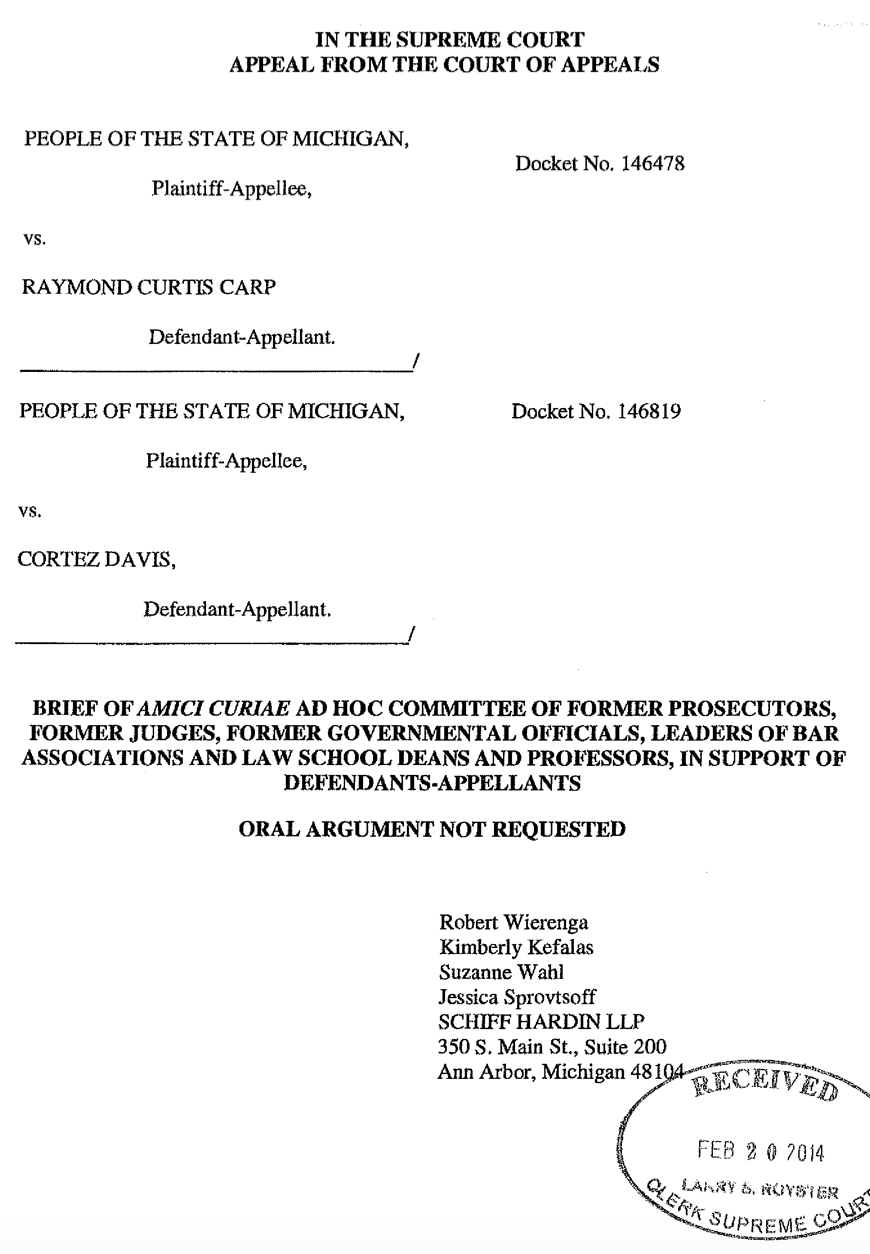
Summary of Argument
With Miller v Alabama, the United States Supreme Court established a new rule of constitutional law regarding what constitutes permissible and proportional punishment for youth under the age of 18. Miller v Alabama, US ; 132 S Ct 2455; 183 L Ed 2d 407 (2012). In holding that the Eighth Amendment "forbids a sentencing scheme that mandates life in prisonwithout possibility of parole for juvenile offenders," the Supreme Court recognized that the Eighth Amendment affords additional protections to children and limited the instances in which a child should serve the most severe sentence available. Id., 132 S Ct 2469. The Court explained that such mandatory sentencing schemes violate the Eighth Amendment's prohibition on crueland unusual punishment because they impose the state's harshest punishment on child offenders without individual consideration of the "characteristics and circumstances attendant to youth" and without recognition that a child's actions, rooted in immaturity and impulsivity, are lessmorally culpable than an adult's. Id., 132 S Ct 2467. The Court's recognition of a child's unique capacity for rehabilitation also led it to conclude that the permissible occasions for imposing a life without parole sentence on a child must be rare and restricted to those circumstances when itis proven that the "crime reflects irreparable corruption." Id., 132 S Ct 2469.1
The Miller Court did more than create procedures for sentencing youth; it also severelylimited the circumstances under which it is appropriate for a child to be sentenced to life without parole. The Supreme Court cautioned that "appropriate occasions for sentencing children to this harshest possible penalty will be uncommon," and strongly suggested that it would never be consistent with the Eighth Amendment for a sentence of life without parole to be imposed on "the juvenile offender whose crime reflects unfortunate yet transient immaturity." Miller, supra, 132 S Ct 2469, citing Roper v Simmons, 543 US 551, 573; 125 S Ct 1183; 161 L Ed 2d 1 (2005) and Graham v Florida, 560 US 48, 67; 130 S Ct 2031; 176 L Ed 2d 825 (2010). The instant cases center on whether the constitutional core of Miller's ruling — i.e., that the Eighth Amendment permits life without parole sentences to be imposed on children only after the State has made an actual, individualized finding that their crime reflected "irreparable corruption" rather than "unfortunate yet transient immaturity" — should apply to those individuals who, like Raymond Carp and Cortez Davis, are serving a mandatory life without parole sentence for offenses they committed as children, but for whom the State has never made the constitutionally-mandated showing of "irreparable corruption." Id., 132 S Ct 2469. Amid believe this Court should apply Miller retroactively to ensure that no individual continues to serve this State's harshest sentence, imposed without individualized consideration of their child status, its attendant characteristics and impact on culpability. To do otherwise would be an ongoing violation of the Eighth Amendment and in contravention of the Supreme Court's findings in Miller. Amici represent a group of 109 individuals from diverse professional experiences including retired judges, former prosecutors, former governmental officials, law school deans and professors, and former bar association presidents. The distinctive and varied backgrounds of Amici imbue them with a unique perspective on the administration of justice in criminal cases based on decades of service to the state and federal courts in Michigan. Moreover, Amici share the belief that the fundamental integrity and fairness of Michigan's justice system requires: (1) Adherence to the Eighth Amendment principle of proportional punishment for all offenders; (2) Adherence to Miller's holding that no person can be required to serve a sentence of lifewithout parole for a crime committed while a child, unless and until the State has demonstrated that the crime reflected "irreparable corruption" rather than mere youthful immaturity; and (3) A fair opportunity for those individuals, who were given the mandatory adult punishment of natural life in prison for an offense committed while a child, to have individualized reviews and resentencings after presentation of circumstances related to their childstatus, lesser culpability and unique capacity for rehabilitation.
Amici are also mindful that Michigan's incarceration of 363 individuals sentenced tomandatory life without parole for crimes committed in their youth has long weighed on the consciences of judges across Michigan. A legislatively prescribed mandatory sentencing scheme removes the judicial discretion that this Court has recognized forms "the backbone of that[judicial] process." People v Milbourn, 435 Mich 630, 700, 461 N W 2d 1, 32 (1990).
Unless and until the State makes an inquiry into "their age and age-related characteristicsand the nature of their crimes" that Miller requires, and determines which, if any, of those individuals committed a crime reflecting the degree of "incorrigibility" that is a prerequisite to sentencing a child to life without parole, Michigan will be imposing a cruel and unusualpunishment that the Supreme Court likened as "akin to the death penalty" on these youthful offenders. Miller, supra, 132 S Ct 2466. Absent such a review, 363 people will continue to serve a sentence that has been declared unconstitutional. Amici urge this Court to apply the protections of the Eighth Amendment for all of this State's citizens and ensure that each of these child offenders serves a constitutionally sound sentence.